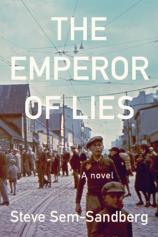Reading Group Guide
Discussion Questions
The Emperor of Lies

1. Discuss the novel’s title. How did the circumstances of the Jewish ghetto destroy the concept of truth? How do the ideas of Rabbi Fajner on page 25 (“A lie has no beginning... A lie always begins with denial”) capture the truth of Rumkowski’s situation?
2. Steve Sem-Sandberg chose to begin the novel with the memorandum that outlined the creation of the Łódź ghetto. How were you affected by the tone of the memo and its closing promise to “burn away this infectious abscess entirely”? How does the memo underscore the value of preserving historical records?
3. What systems of leverage --- for food, for warmth, for being spared deportation to death camps --- emerged in the ghetto? Did Biebow really need Rumkowski, or were Biebow’s actions part of a sadistic mind game, forcing an elder Jew to assign values to the lives of his people?
4. Reread the prayer that opens Part II on page 283. What does it say about the nature of faith in the face of horrific religious persecution? How did the ghetto’s religious leaders (particularly Moshe Karo, keeper of holy books) make sense of tragedy?
5. Pages 22 through 24 present a story from Rumkowski’s boyhood, describing his ill-fated attempt to become an informant and win the respect of his Talmud teacher, Stromka. What does the story reveal about Rumkowski’s temperament and his idea of ethics?
6. Rumkowski’s infamous speech (“give me your children”), delivered 4 September 1942, is reprinted on pages 257 to 261. Read portions of it aloud. What is the effect of hearing the words, rather than letting them remain silent on the page? If you had been in Rumkowski’s position, would you have complied with the demand, or would you have rallied ghetto residents to resist at any cost?
7. Marysin is described on page 147 as “a place for the others: the wealthy, men with power and influence” --- the opposite of deeply impoverished Bałuty. Discuss the social order that emerged in Łódź, including attitudes toward the Prague Jews. Who rose to the top in this complex network, where any attempt to overturn the system could be punishable by death?
8. As head of the Special Department (Sonderabteilung) police force, did Dawid Gertler mirror the German officers in some ways, or did Gertler have noble intentions?
9. What is evoked by the story of Adam Rzepin as he tries to protect his sister Lida and come to terms with his uncle Lajb’s downfall? Why is it appropriate for the novel to close with an image of Adam having shot a German, then experiencing a tragic “liberation”?
10. What hungers did Rumkowski satisfy when he married Regina and adopted Stanisław? How did sex and power feed each other in Rumkowski’s world? What were the costs and benefits of being part of his inner circle?
11. Page 269 depicts Mrs. Herszkowicz’s attempts to impress the German officer with her perfect assembly, costing Lida her life. What explains her desire to impress him rather than protect her neighbors? How did her actions reinforce her idea of herself as being part of an educated class?
12. The spectrum of characters ranges from Princess Helena, with her chandelier and smorgasbord, to Rosa, who tenderly cares for the children of the Green House; Józef, who oversees life (as an orchard grower) and death (as a grave digger); the Czech-speaking Vĕra, who honors her frail mother until the end; and many other distinct identities. Which of the characters were most memorable for you? In circumstances such as theirs, what determines who will remain generous and who will become self-preserving?
13. Discuss the ultimate question at the heart of Rumkowski’s legacy: Was it shameful of him to comply with the Nazis, or was he a heroic victim?
14. In this novel, what are the makings of a survivor? What separated those who ran to the fence, like Cwajga Blum, from those who were determined to stay alive? Was compassion a liability in Łódź?
15. In his afterword, Sem-Sandberg contemplates the authors of the Ghetto Chronicle and their motivation. On one hand, the Chronicle served as the mouthpiece for Rumkowski. Yet it was also intended to be a testimony for future readers (us). How were you affected by this knowledge, and by Sem-Sandberg’s description of the challenges it posed? What can novels say better than history books?
16. How does The Emperor of Lies differ from other key works of Holocaust literature, such as Schindler’s List or Elie Wiesel’s Night Trilogy, that you have read?
The Emperor of Lies
- Publication Date: August 30, 2011
- Hardcover: 672 pages
- Publisher: Farrar, Straus and Giroux
- ISBN-10: 0374139644
- ISBN-13: 9780374139643







